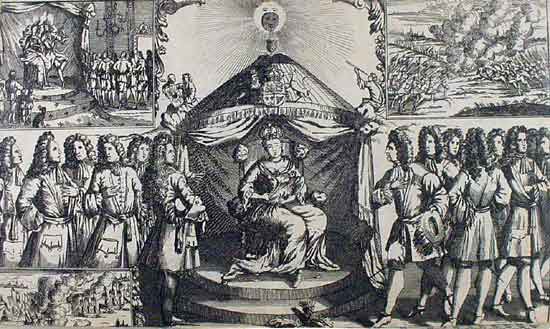
"The Sun in an Eclipse" (1707)
 |
This satirical engraving is taken from a series of seven, all satirizing the French King Louis XIV and his allies, that appears in the fourth volume of the important and popular satirical anthology, Poems on Affairs of State. The engravings relate to the defeats suffered by the French alliance in the War of the Spanish Succession in the year 1706; the series is introduced by the following note:
| A Collection of some Satyrical Prints, publish'd beyond Sea, relating to the Affairs of Europe, since the French King plac'd his Grandson on the Throne of Spain. With their Explanations in English. |
|
[Poems
on Affairs of State, Vol. 4 (London, 1707) 435.]
|
This engraving features an allegorical depiction of Queen Anne, victorious after a year of victories over the French, eclipsing the "Sun King," Louis XIV. The allegory is explained in a gloss that appears on the facing page:
| In this Cut is represented the Sun in an Eclipse; or Lewis XIV. eclips'd by Queen ANNE. On the right Hand in the same Square are two Astrologers, taking their Observations; Queen ANNE is in the Centre, on a Throne, holding the Cock, whose Wings she clips to prevent his Flight, in her Hand. The Figures on each side of Her are her Counsellors and Generals. The Fleet in the Corner on the left Hand side is, Admiral Leak's Triumphing over the Count de Toulouse Admiral of France. The Battel on the right-side of the Sun is drawn for that of Ramilly or Judoigne; the Church of the last Town appearing at a little distance. On the other side of the Sun, the French King and his dear Wife or Mistress Madam Maintenon are represented in close Conference. |
|
|
|
* The Sun was in an Eclipse on the 12th
of May, 1706. the same Day on which Philip the V. made a
shameful Retreat from before Barcelona. [Note in POAS]
|
|
[Poems on Affairs of State, Vol. 4 (London, 1707) 437.] |
The War of the Spanish Succession began formally in May of 1702, with the declaration of war against France by England and Holland. In some regards, this war was really an expression of William III's ongoing policy of containing French expansionism on the Continent; the last conflict with the French, the War of the Grand Alliance, had ended in something of a stalemate with the Treaty of Ryswick in September of 1697. An important issue left unresolved by this peace treaty was the question of the succession to the Spanish throne. Charles II of Spain was mentally ill, and childless, and it had long been apparent that there would be conflict between the two claimants to the throne, Philip of Anjou (a Bourbon) and Archduke Charles of Austria (a Hapsburg). As the former was grandson of Louis XIV, a Bourbon succession raised the prospect of a united French and Spanish empire that would undoubtedly dominate both the new world and the old. This development William III, and most other European monarchs, were determined to oppose.
Charles of Spain died in 1700, leaving a will that bequeathed his throne to Philip of Anjou, who was promptly recognized by Louis as Philip V of Spain; when Louis further recognized James Francis Edward Stuart — the "Old Pretender" — as the legitimate King of England upon the death of the ousted monarch James II in 1701, war with England became inevitable. William assembled a new "Grand Alliance" of Continental powers to oppose French ambitions, and recognized Charles of Austria as Charles III of Spain.
Although William died shortly after his declaration of war, his successor, Queen Anne, determined to carry on the war, appointing the John Churchill, the Duke of Marlborough, as Captain-General of British forces abroad. Under his command, the Alliance achieved an impressive victory at Blenheim in 1704; Gibraltar was captured by the British Navy in the same year, and Barcelona in 1705.
1706 was the high-water mark for allied war efforts: following a brilliant victory at Ramillies (represented in the upper right-hand corner of the plate, above), Marlborough was able to expel the French from the Low Countries, while Marlborough's ally, Prince Eugène of Savoy, beat the French forces in Italy at Turin. In Spain, allied forces captured Madrid, expelling Philip V from his capital. These achievements are the focus of the satirical/panegyrical plates published in Poems on Affairs of State, itself a virulently Whig — and hence, pro-war — collection that was intended, in part, to bolster popular support for the war effort.
Allied fortunes ebbed somewhat in the years that followed the annus mirabilis of 1706; the Grand Alliance suffered a severe defeat in Spain at Almanza in 1707, and increasingly pyrrhic victories by Marlborough at Oudenarde in 1708 and Malplaquet in 1709 made it evident that a complete defeat of France was not possible. Meanwhile, opposition to the prolonged war grew in England, resulting in the fall of the Whig government in 1710, and its replacement by a pro-peace Tory regime lead by Henry St. John and Robert Harley. In 1713 the Treaty of Utrecht took England out of the war (a betrayal of its allies that earned it the sobriquet "perfidious Albion"): Philip V was recognized as King of Spain, but this kingdom was not permitted to unite with France under a single crown. Meanwhile, England regained most of its lost territories (mostly in North America), and added Gibraltar and Minorca to its possessions. The Protestant succession in England was recognized by Louis, and English merchants were granted the lucrative Asiento, permitting them to engage in the slave trade in Spanish America. The passing of this treaty in Parliament created a major political firestorm in England, and was, in part, responsible for the fall of the Tory ministry in 1714.
Plate reproduced from:
| Poems on Affairs of State, From 1620. to this present Year 1707. Many of them by the most eminent |
|
|
ESTC t144916 |
 |
Website maintained by: Mark
McDayter
Website administrator: Mark McDayter
Last updated: April 25, 2002